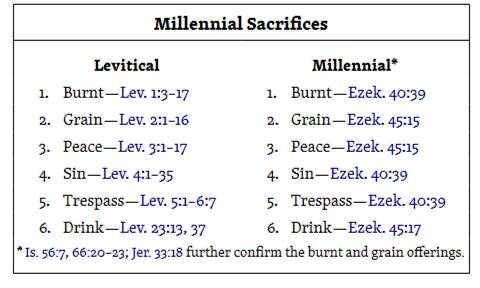Ezekiel 45:18-22
Chapter 45 tells us that the Feast of the Passover will be kept:
Thus saith the Lord God; In the first month, in the first day of the month, thou shalt take a young bullock without blemish, and cleanse the sanctuary:
And the priest shall take of the blood of the sin offering, and put it upon the posts of the house, and upon the four corners of the settle of the altar, and upon the posts of the gate of the inner court.
And so thou shalt do the seventh day of the month for every one that erreth, and for him that is simple: so shall ye reconcile the house.
In the first month, in the fourteenth day of the month, ye shall have the passover, a feast of seven days; unleavened bread shall be eaten.
And upon that day shall the prince prepare for himself and for all the people of the land a bullock for a sin offering [Ezek. 45:18–22].
The Passover definitely refers to Christ: we are told in 1 Corinthians 5:7, "… For even Christ our passover is sacrificed for us."
At this point we must answer a major question: Since
all the sacrifices of the Old Testament were fulfilled in Christ, why are they
restored again during the Millennium? This is a major argument that
amillennialists have against the premillennial position. I personally find no
conflict here. I feel that the sacrifices offered during the Millennium are
going to look back to the coming of Christ and His death upon the Cross in the
same way that in our day the Lord’s Supper looks back to them. Someone will ask
why the literal offering of sacrifices will be necessary. My friend, the
human family has a great deal of difficulty learning a lesson. For the same
reason, I believe that the literal blood of Christ is going to be in heaven. It
will be there to reveal to us the horrible pit out of which we were digged. Our
salvation from sin and hell unto heaven was a pretty big job, one that only God
could undertake. The blood of Christ will be in heaven to remind the church of
this, and the sacrifices will also be restored here on earth to reveal to the
people of Israel how they were redeemed.
McGee, J. V. (1991). Thru the Bible commentary: The Prophets (Ezekiel)
(electronic ed., Vol. 25, p. 212). Nashville: Thomas Nelson.
Eze
40:38–47 This section describes “chambers” for the priests, and raises the question of sacrifices in the millennial kingdom. They will exist as vv. 39–43 indicate, but will be no more efficacious then than they were in OT times. No sacrifice before or after Christ saves. They only point to Him as the one true Lamb who takes away sin. The Lord’s Supper is a memorial that looks back to Calvary and in no way diminishes the cross. Israel rejected their Messiah, but when they have received Him and are in His kingdom, they will have a memorial of sacrifices that point to Him. They will have missed the memorial of the Lord’s Supper, but will then have their own memorial sacrifices for 1,000 years.